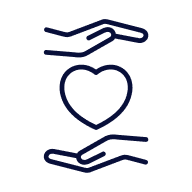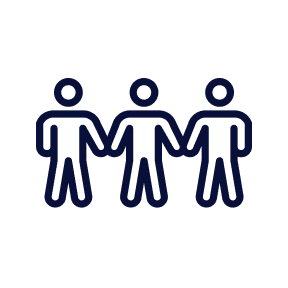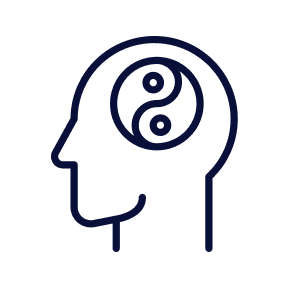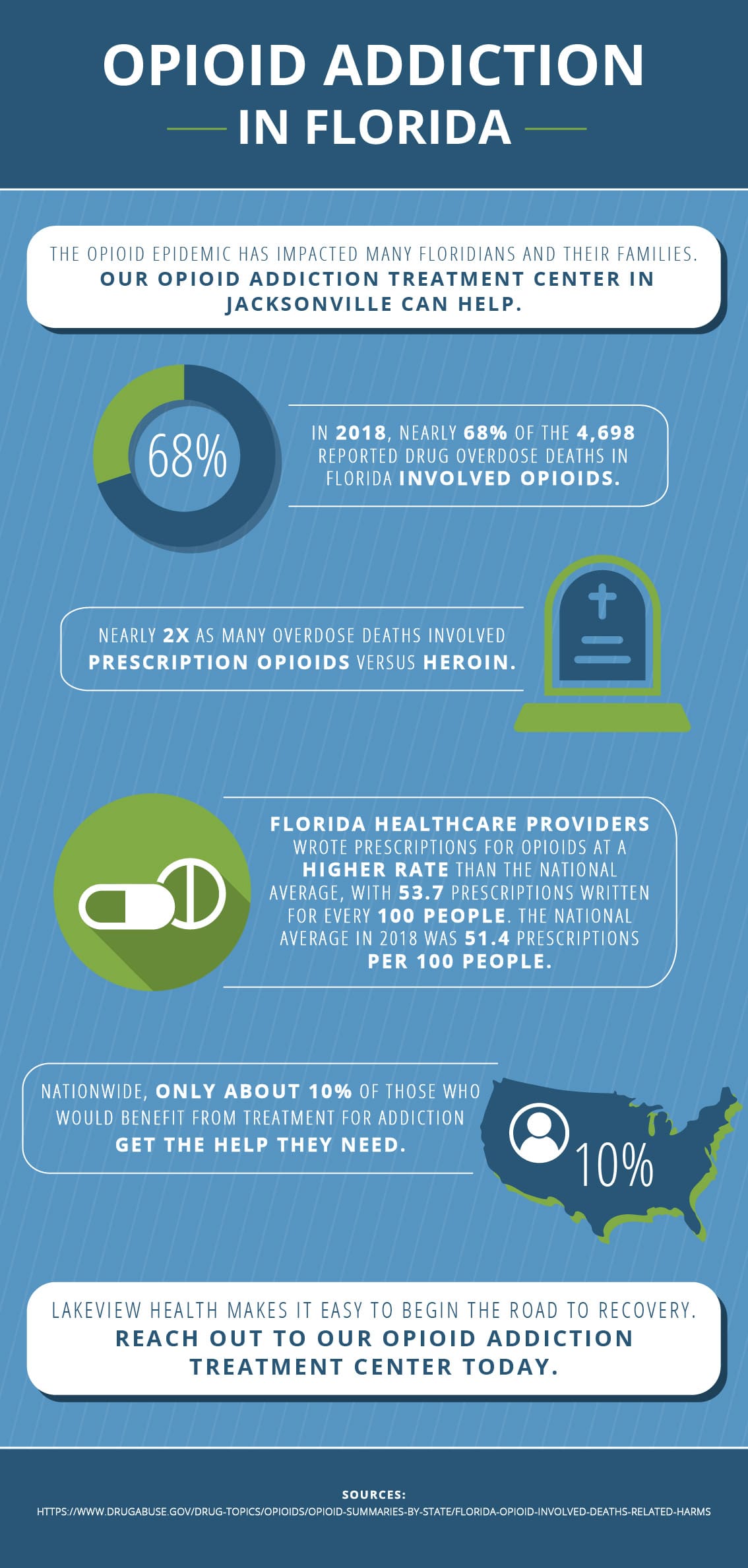
These natural, synthetic, or semi-synthetic substances can include prescription pain relievers like Percocet and OxyContin as well as illicit drugs like heroin. Even legally prescribed opioids have the potential for abuse. If you or a loved one are struggling with a dependence on opioids, an opioid addiction treatment center can help.

Through a full continuum of care that includes medical detox, residential treatment, outpatient treatment, and aftercare programs, our patients develop the healthy coping skills they need for lifelong recovery. In addition, individual and group therapy sessions offer a supportive environment where patients can work through the underlying causes of addiction. To overcome opioid addiction, reach out to our team for help.
At Lakeview, we also offer Clonidine therapy. A proven treatment for opioid addiction treatment that has been very effective for our patients.
At Lakeview Health, our detox center will help you be as comfortable as possible during this process. Painful or uncomfortable withdrawal symptoms can make maintaining sobriety a challenge. However, we offer the emotional support and medical interventions needed for you to build a strong foundation for recovery. Our multiple levels of care make us uniquely equipped to help patients every step of the way. As you begin to rebuild your life in recovery, you’ll have support from our team and from your peers in recovery. We can help you access community resources as you work to build the healthy coping skills you need.
Many of those who struggle with opioid addiction experience chronic pain. Opioids can be prescribed to treat pain and are highly effective at doing so. This means that it’s important to treat chronic pain at the same time that we treat dependency. We offer chronic pain treatment that can help you learn how to manage pain without relying on opioids.
Treatment options for opioid use disorder
Medically assisted detoxification programs:
One of the most common misconceptions surrounding addiction is that it is a mere matter of willpower and that people with opioid use disorder can stop on their own. Opioid users may feel as though they have complete control and that stopping is no issue. However, detoxing from opioids on your own can be extremely dangerous. Medication-assisted therapy may need to be introduced during the opioid detox process, which should only be done under expert medical supervision.
Medication-assisted treatment (MAT):
Medications can help reduce or stop cravings to use opioids. These medications are one of the most effective ways to combat relapse and the dire risk of relapse-associated overdose and death. Medications are most effective when combined with behavioral and holistic treatments and a mutual-support group. Non-addictive, FDA-approved medications for OUD include naltrexone (oral and long-acting injectable), lofexidine, methadone and buprenorphine.
Behavioral treatments:
These treatments involve “talk therapy” or counseling. Therapists may have different approaches (such as cognitive behavioral therapy, dialectical-behavioral therapy and holistic therapies). These therapies focus on introspection, mindfulness-techniques, teaching emotional intelligence and facilitating changes in your life that will assist in your recovery journey. The skills you learn during this stage of treatment will provide you with new, healthy ways to cope with life’s difficulties. They will help to combat and replace unhealthy coping mechanisms (such as abusing substances).
Mutual-support groups:
Social support is often integral to creating and maintaining a lifestyle free of substance abuse. Communities often have support groups that meet at convenient times and places or online. These groups, like Narcotics Anonymous (NA) and SMART Recovery, add another layer of support to your recovery process.
Cost of treatment for opioid addiction:
Treatment costs for opioid addiction will vary based on each person’s clinical needs and their insurance coverage or ability to pay out of pocket. Lakeview Health works with most major health insurance providers and our team does everything they can to ensure the insurance verification process is simple and stress-free. If the patient does not have insurance coverage, the admissions team can work on a payment plan. Providing treatment is the main priority.
Lasting recovery from opioid addiction is possible. Your treatment plan will be personalized to meet your unique needs and goals. During an initial assessment, our team will learn more about your experiences with opioid addiction, any co-occurring mental health issues, and any treatment programs you’ve gone through in the past.
We offer a number of different therapies and services in our Jacksonville recovery center. No two patients are alike which is why we offer different amenities and approaches to treatment. Some patients benefit from family therapy or faith-based groups while others thrive in art therapy or music therapy.
Therapies and services at Lakeview Health include:

Acknowledging trauma and understanding its effects on a person’s life and their substance use disorder is an important aspect of therapy.

Substance use disorders often lead to isolation and loneliness. Group therapy is a place to connect with others in recovery. These sessions often are supportive, encouraging and motivating.
One of the most powerful ways to get to know yourself is to try new hobbies or get back into old ones. Experiential therapy is therapy that is facilitated during or by an experience, such as music therapy.

This therapy associates how you think about events, people or stressors and the effect of your thoughts on your behaviour. The focus is on how to understand these patterns and how to build new habits and behaviours that are healthier.
People rarely anticipate the need for treatment at a drug and alcohol treatment center. Many people fall into prescription drug addiction because their doctor prescribes opioids for acute or chronic pain. Percocet and Vicodin are popular prescription painkillers that have started many people down the path to addiction. Others purchase opioids through other avenues to feel their euphoric, pleasurable effects, and unfortunately, their abuse spirals into addiction.
The road to opioid addiction starts with the first use of the drug. After the first use, one may quickly realize how good they felt when taking opioids, compared to how they felt without them. In this way, painkiller addiction likely begins through self-medication of anxiety, depression, chronic pain, or another real medical condition.
Opioids change how the brain works. These drugs activate the reward centers of the brain, triggering the release of feel-good brain chemicals. This flood of pleasure chemicals soon becomes something the brain becomes dependant on. So over time, one may increase their dose and continue using opioids, despite knowing the life damage these drugs cause.
As the drug’s effects wear off, cravings begin again. As one continues using more and more opioids, they venture further down the path to addiction. Even worse, they risk deadly overdose like so many Americans have experienced from opioids. No matter how addiction begins, the best next step is to reach out to an opioid addiction treatment center.
When opioid receptors stop getting stimulated (the drug is not taken), areas of the brain release noradrenalin. The body goes into autonomic hyperarousal (the fight, flight, freeze or fawn response) and will stay there. This response is the main cause of many opioid withdrawal symptoms.
Long-term opioid use affects most of the body’s systems, so the symptoms of withdrawal will too. Symptoms can start within 12 hours of the last dose and usually last a few days or up to 2 weeks.
Learn more about opioid use disorder here.
In addition, Lakeview Health offers dual diagnosis treatment for those who struggle with both opioid addiction and co-occurring mental health issues. This approach promotes long-term recovery and reduces the risk of relapse.
Did you know that most overdose deaths today occur because of opioid abuse? Rarely, if ever, do any of these people start their addiction purposefully. Most people believe they can outwit the addictive tendency of their drug when they start using it.
If you’re not sure whether you or a loved one would benefit from opioid addiction treatment, consider the following:
- Have you relapsed after a period of sobriety?
- Do you use opioid pain relievers in ways other than as prescribed?
- Have you gone to more than one doctor for a prescription?
- Do you experience withdrawal symptoms when you stop taking opioids, such as anxiety, insomnia, nausea, or vomiting?
- Have you experienced personal or professional trouble as a result of your opioid use?
If you’ve noticed any of these signs in yourself or in a loved one, reach out to Lakeview Health today. Our opioid addiction treatment center offers hope.

